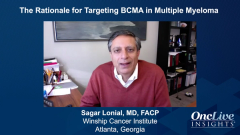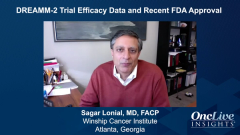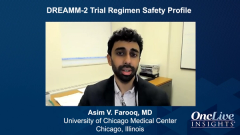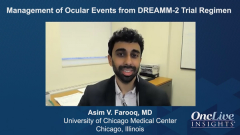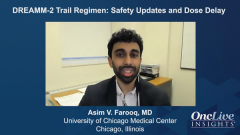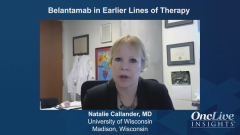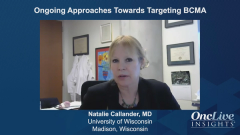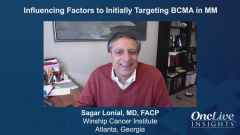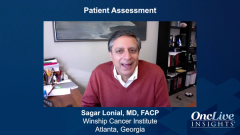
Ongoing Approaches Toward Targeting BCMA
Episodes in this series

Sagar Lonial, MD, FACP: As we have discussed, targeting BCMA through an antibody-drug conjugate is certainly an exciting treatment approach for which we now have an FDA approved drug to go after. To me, this is important and exciting because, as I mentioned, BCMA is in many ways an ideal target in the context of multiple myeloma. One of the challenges for us in the near future is how do we bring belantamab mafodotin into earlier lines of therapy so that we can partner it with other drugs? There are combination trials that are being evaluated. My colleague Ajay Nooka, MD, MPH, FACP, has reported on combining belantamab mafodotin with bortezomib and has demonstrated safety and efficacy. There are additional data combining belantamab mafodotin with pomalidomide. Figuring out the dose and schedule of an antibody drug conjugate in combination with other known active agents in myeloma is part of our typical strategy for bringing drugs that are approved in the refractory myeloma setting to earlier and earlier lines of therapy.
Now, the other targets for BCMA that are exciting are the CAR [chimeric antigen receptor] T cells, and we have several of them that are in development. These include idecabtagene vicleucel or bb2121. Orvacabtagene autoleucel is another one, or ciltacabtagene autoleucel, which is part of the CARTITUDE-1 study. There are a number of trials evaluating each of these 3, and there are up to 7 or 8 different BCMA-directed CAR T cells that are being done in phase 1 and phase 2 studies in myeloma. What is quite interesting is that we know, for instance, that the rates of grade 3/4 cytokine release syndrome [CRS] or neurotoxicity are significantly lower than what we have seen with CD19-directed CAR T cells in lymphoma or diffuse large B-cell lymphoma.
That is one difference between CD19 and BCMA. We also know, however, that there does not as yet appear to be a plateau on the treatment curve. This is unlike CD19 where, if you achieve a CR [complete response], and that CR is durable for 6 to 9 months, the likelihood of relapse drops significantly. In BCMA-directed therapy, it is not clear that that necessarily happens, so we need to learn more about the biology of CAR T cells in myeloma to understand how to maximize persistence and duration of response in many of these patients because the median progression-free survival looks to be somewhere around 11 to 12 months, at least for bb2121, which is the furthest along that we have.
Now, the third area that we are excited about when we target BCMA is the area of bispecific antibodies or T-cell engagers. These are antibodies that have been engineered to express CD3 and BCMA, and their function is to bring a T cell next to a myeloma cell by bringing BCMA-expressing, T-cell expressing, or CD3-expressing cells in close proximity. We know with CD19 and blinatumomab that this can be a highly effective strategy. We have seen in phase 1 studies, whether it is CC269, Amgen-402, or daclizumab, that these agents can be quite effective at the maximum tolerated dose. In many anecdotal situations, we are hearing that patients who progress on BCMA-directed CAR T cells may respond to the T-cell engagers, so this is an important next step in the biology and treatment approach for patients with myeloma. It certainly represents an important step forward for treatment of refractory myeloma.
Natalie Callander, MD: At ASH [the American Society of Hematology 2020 annual meeting], there were updates on a lot of belantamab mafodotin data that continued to show high response rates. There were some interesting presentations about quality of life, where patients who responded to belantamab mafodotin reported increased quality of life with less bone pain and less fatigue. The ocular toxicity that people are aware of with belantamab mafodotin seemed to improve over time as patients got more drug exposure, which is great.
There is also another antibody-drug conjugate that Shaji Kumar, [MD,] presented: MEDI2228. This also had high response rates, but it has some interesting toxicities that have to do with the PBD [pyrrolobenzodiazepine] payload. They saw a fairly high incidence of photophobia in about 50% of patients. They also saw some trouble with pleural effusions, and rashes were pretty common in about a third of patients. Although they had very high response rates, they discontinued the agent after about a median of 3 cycles. I suspect that there is going to be more investigation about how to use that drug to capture its effectiveness and try to minimize toxicity.
There was a lot of CAR T action at both ASCO [the American Society for Clinical Oncology annual meeting 2020] and at ASH. There was a big presentation at ASCO by Nikhil Munshi, MD, looking at the update of the KarMMa trial where they had 128 patients. It had high response rates in the 75% range, 83% in those getting the highest doses, with manageable CRS. The most common toxicities ended up being hematologic, but the CRS that was serious was grade 1 or less. It was grade 1 in about 75% of patients, but beyond that, it very well tolerated and had low rates of neurotoxicity.
The CARTITUDE-1 trial was updated here at ASH by Deepu Madduri, MD. They had a large number of patients to present as opposed to a year ago. They also saw high response rates of about 97% with the CARTITUDE-1 trial. They are showing a bit of a different toxicity profile for a couple of reasons. One is that there was a slightly higher incidence of neurotoxicity that was significant compared to the bb2121 product. The onset of CRS is later, interestingly; instead of day 1, which is the median with bb2121, it ends up being more likely day 7.
Some of the other updates on CAR T: the Poseida Therapeutics product looks good. The Chinese investigators here at ASH had a couple of presentations on different manufacturing methods and a dual-targeted CAR T targeting CD19 and BCMA, so that is a lot of action. It remains to be seen if one appears to be superior to the other. Of course, all these are being moved up earlier in the line of therapy to see whether there can be greater persistence of CAR T because that is one thing that has been a bit disappointing. As opposed to lymphoma, it does not yet look that there is a plateau in response in some of the heavily pretreated patients. Patients are still relapsing, so we obviously have to figure out how to make these products work better and work longer.
There was an update by Adam Cohen, MD, here at ASH on teclistamab, which has high response rates. That drug is already getting combined with other drugs. He presented data using this drug intravenously but also subcutaneously at a fixed dose. Their data looked very interesting.
The CRS was manageable: it occurred mostly with the first doses, and it then started to go down, so we are hoping that, perhaps after initial hospitalization when you receive this drug, you will be able to receive it as an outpatient. It has manageable CRS with just a low use of steroids. It has high response rates in the range of over 80% in heavily pretreated patients.
There is also the Celgene Corp product that was updated at ASCO, and it looks promising as well. Right now, that is still intravenous administration. They also had a presentation at ASH on Amgen [AMG]-701. AMG-701 is another bispecific engager that looks promising; it builds on their original data with AMG-401, which was a 4-week infusion. This is a weekly infusion, and it looks promising with high response rates and manageable toxicity.
Transcript Edited for Clarity


